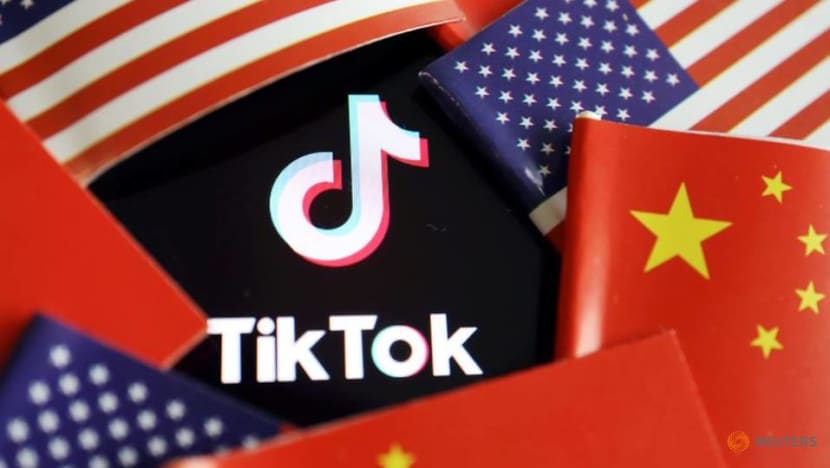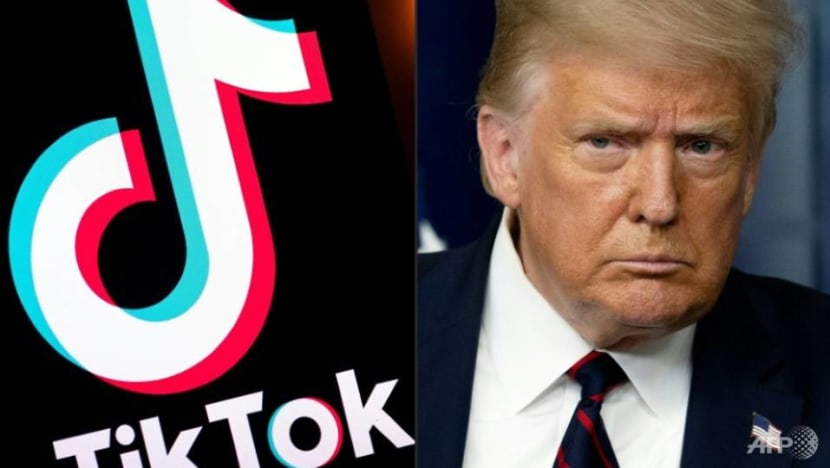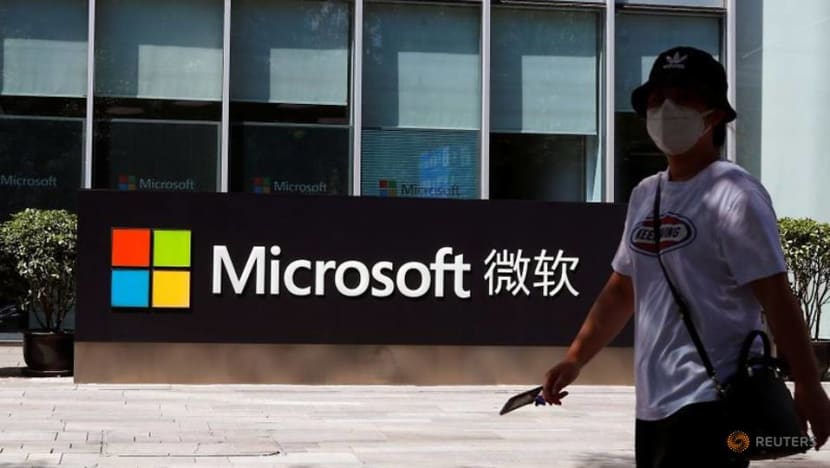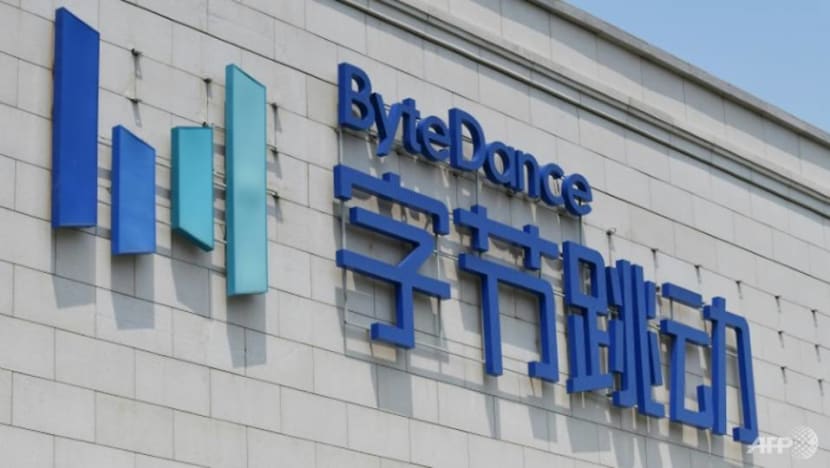commentary Commentary
Commentary: Will the TikTok saga in the US lead to the break-up of the Internet industry?
The precedence could spark a series of coerced acquisition of social networking apps in countries that are either worried about their impact on national security or intend to practise trade protectionism, say Dr Lau Kong Cheen and Dr Vanessa Liu.

FILE PHOTO: China and U.S. flags are seen near a TikTok logo in this illustration picture taken July 16, 2020. REUTERS/Florence Lo
SINGAPORE: The rise of TikTok, a Chinese-owned video-sharing social networking app to global popularity has been amazingly phenomenal.
Unfortunately, it has recently been caught in the political spat between the US and China.
Under the guise of being a national security threat, the US has given TikTok an ultimatum to be banned from the country, leaving behind approximately 80 million active American users, or face a forced acquisition of its local operations.
Since then, American software giant Microsoft Corp has indicated that it is willing to carve out TikTok from its Chinese-owner ByteDance with the Donald Trump administration giving them until Sep 15 to show a blueprint of how it may do so while taking data security of Americans into account.
WILL WE SEE A NEW PRECEDENCE?
If this scenario pulls through, will other tech companies of similar nature suffer a fate parallel to this?
The anxiety of this fear is understandable.
READ: Commentary: WeChat ban a formidable weapon in US-China trade war
This precedence could potentially spark a series of coerced acquisition of promising foreign-owned social networking apps in countries that are either worried about their impact on national security or intend to practise trade protectionism.
Some countries may use such draconian efforts to rob these brands from their technology and pass them on to their local enterprises as “copy cats”.
What is even more worrying is that this could discourage future “TikToks” from emerging – stifling innovation and growth for the future. Are such fears justifiable?
For any business acquisition attempt, even considering one that is forced, there must be value derived from it to be monetised. What is the value that is worth acquiring?
For a successful technology-based business, their strategic value is a combination of three major components that encompasses its brand, technology and customer data.

Their brand contributes value in terms of their trademark and equity that is the source of its seductive appeal.
Technology is the engine that drives the experience offered by the app. This is where the essence of the intellectual property lies.
Value derived from customer data cannot be underestimated. It provides valuable insights of customer consumption patterns, preferences and behaviour where new products and services can be developed.
In fact, one of the strongest appeals of TikTok to potential acquirers is the customer data it possess.
MITIGATING THE THREAT OF FORCED ACQUISITION
With this understanding, technology businesses could consider a couple of options.
First, they could opt to register their business and their global headquarters in politically stable and open countries such as Singapore. This would minimise their disruption to policy changes.
Second, they could formulate a strategy to protect their business by structuring and segregating the ownership of their three key value components into different entities while setting up operations in countries.
READ: Commentary: TikTok and Microsoft and how government agendas are reshaping Big Tech
In the event of a forced acquisition, only the customer database could be divested with the technology and brand ownership components left intact.
Given this, the acquisition will be far less attractive and could drive buyers away. Even if the acquisition succeeds, the damage to the business is minimised as they could still operate in other markets.
In the case of TikTok, the situation they face in the US is a bigger setback for them than it has to be because their value components are overly integrated.
Third, a technology company could structure its business with multiple brands catering to key geographical markets along sensitive political lines under one corporate brand.
For instance, a low profile corporation, representing the parent brand which then owns individually operated product brands for markets such as the US, Western Europe, Eastern Europe, South East Asia and China, among others.
As such, each market will be perceived to be operating independently, signalling the assurance of locally managed data.
With this approach, the perceived risk to national security can also be better managed.

Even if a politically instigated hostile acquisition is imposed in a particular country, the parent company could sell their product brands that are independently operated and make a hefty profit without any impact on their global operations.
EMPHASIS ON THE PROTECTION OF USER PRIVACY
However, the application of risk management strategies is defensive play.
Technology companies must also learn to be politically engaging with governments, especially appeal to their national security concerns in general and safeguarding of personal data in particular.
READ: Commentary: Would using TikTok really have national security implications?
TikTok’s setback was that they drew scepticism in their ability to protect customer data. The US government used this as a major point of contention putting them in their current scenario.
TikTok did not do enough to win the trust of foreign governments that are highly suspicious of Chinese companies like its parent company ByteDance.

For instance, TikTok only launched a new app feature in April 2020 for reporting deceptive information after independent auditors advised them a month ago of inadequacies in their data protection practices.
To earn credibility on data security, astute public relations campaigns emphasising serious personal data protection practices as a core value of the brand will be crucial for tech companies of the future.
READ: Commentary: Why is a consumer watchdog suing Google?
Underlining these outreach initiatives, tech companies with the intention of expanding overseas should reengineer their software development and reform their data privacy protection policies to enhance data transparency and security.
There are many ways to do it, such as open-sourcing the algorithms on which what data users see are determined, and conducting periodic audits of data collection and content moderation policies.
HOW REALISTIC IS THIS THREAT?
Let’s examine two different scenarios.
For innovations from developed economies such as US and China, venturing into developing countries, the threat of being banned or forced acquisition should be minimal.
Forced acquisition may be too expensive an option. Even if affordable, the technological infrastructure and brand equity in developing countries may not be ready to leapfrog ahead.
READ: Commentary: It was always going to be hard for Huawei to stay in Western markets
For innovations from developing countries venturing into developed economies, tech companies would have to address worries over censorship and control. Effective remedies on data privacy risks should mitigate the threat of being banned or acquired by pressure as discussed earlier.
Clearly, the main motivation behind the TikTok saga is a political attempt to alleviate China’s global technology power and, if so, similar threats are unlikely to exist in countries that are not rivals or competitors.
More importantly, such action will inhibit trading activities and prevent global or regional economies to flourish when a state of protectionism is practised by every country and could worsen the trade war that has already caused an unwarranted global economic impact.
Not many economic powers are like the US and China. Few can afford to establish a massive national firewall, offering a domestic market with purchasing power that is sizeable enough for domestically developed innovations to be self-sufficient.

Therefore, many countries cannot afford taking similar hostile decisions and effect their international relations.
While the acquisition by Microsoft may be a solution for TikTok, it may not be a good enough business model for other tech companies who plan to penetrate overseas markets.
Entering into joint ventures with domestic companies still may not be able to address the root concerns associated with privacy and security risks imposed by foreign authorities.
The TikTok saga also has little impact on stifling innovation. Before TikTok triggered data security concerns in the US, Facebook already attempted to launch an app highly similar to TikTok called Lasso in 2018.
READ: Commentary: This call to break up Big Tech is rather misguided
The app was closed down in mid-July earlier due to low active usage. In other words, regardless of techno-nationalism intervention, copycat apps will boom if the products demonstrate proven success. For instance, Instagram recently launched Reels - a TikTok-like short-looped video service.
Furthermore, some apps may be conceived initially as copycats. This does not hinder continuous improvement over existing innovations.
Consider the China market. Many domestic apps flourished behind the great firewall. Initially as a copycat to WhatsApp, WeChat has ended being a comprehensive online platform supporting multiple novel functions through its ongoing technological upgrades.
Innovation often thrives in adversity, the TikTok saga will not deprive us from more exciting apps in the future.
Dr Lau Kong Cheen and Dr Vanessa Liu are senior lecturers, Marketing Programme at the School of Business in the Singapore University of Social Sciences.














